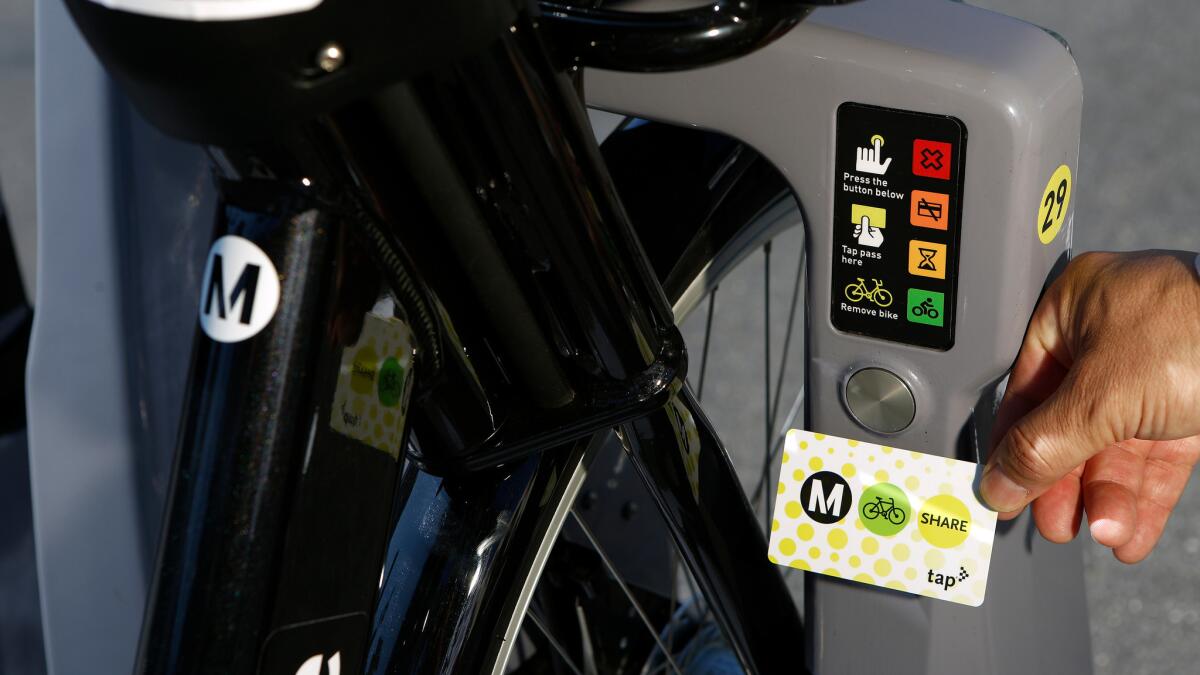L.A.’s new bike-share program isn’t as popular as those in other cities

- Share via
Ridership on Los Angeles County’s new bicycle sharing system has been smaller in its first months than on similar programs in other major U.S. cities, a Times analysis found.
Angelenos and tourists took more than 55,400 rides, or an average of 73 trips per bicycle, on the downtown Los Angeles system between its launch in July and the end of September.
For the record:
4:40 p.m. April 18, 2025An earlier version of this story said Santa Monica’s program averaged 58 trips per bike in its first three months. The correct figure is 67.
Chicago’s bike-share program registered twice as many trips per bike and New York City’s six times as many during the first three months of operations. Data from Washington, D.C., and San Francisco also show higher ridership rates than the local effort.
The $11-million program differed from its counterparts in other major U.S. cities in ways that affected early ridership, including the scope of the system and the pricing structure, officials with the Metropolitan Transportation Authority said, adding that they were pleased with the figures.
“We are known for being a car-centric area,” said Laura Cornejo, a Metro deputy executive officer. “It’s really a great performance given the history of Los Angeles.”
New York, San Francisco and Washington made bike-share available in many neighborhoods at once, and immediately opened the programs to all users.
In L.A., Metro opted to launch bike-share exclusively downtown, where riders have access to more jobs, transit stations and bike lanes than in most Southland neighborhoods, officials say.
“We’re not New York, we’re not Chicago,” Cornejo said. “For every city, you need to look at what the culture is, what the infrastructure is, and what the political and community dynamic is.”
Ridership has increased steadily, suggesting that the longer that the system is available, the more comfortable users will become with it, officials said.
The program is expected to expand to Pasadena, Venice and the Port of Los Angeles next year.
For the first month, Metro restricted the Los Angeles program to riders who purchased a monthly or annual pass. Data analyzed by The Times show that more than two-thirds of rides were taken by pass holders, rather than more casual users.
Ridership figures in downtown Los Angeles were higher than in Santa Monica, which averaged 67 trips per bike over the same time frame when its program launched last year.
The system is designed for users to pick up a bicycle at one station and return it to any other station in the system. The short trips are aimed at bridging the so-called “first mile, last mile” gaps between transit stations and destinations.
L.A.’s bike-share program offers 51 kiosks and about 760 bikes for rent downtown, mostly situated near transit stops, entertainment venues and tourist destinations.
The program was originally expected to include almost 1,100 bicycles and 65 kiosks, but construction and lane closures on downtown streets have made it difficult to install some kiosks, Metro spokesman Dave Sotero said.
The most popular check-out station was outside the Caltrans building across from City Hall, followed by the Grand Central Market on Broadway, according to Metro data.
Lon Soh commutes by train from the City of Industry to Union Station each morning. He uses bike-share to ride to and from the Caltrans building, where he works for the city transportation department.
“It beats walking,” said Soh, who buys a $20 monthly pass. Under that plan, trips shorter than a half-hour are free.
At $40 per year, trips shorter than a half-hour cost $1.75 — the same as a one-way Metro fare.
In the long-term, riders who don’t want to sign up for a membership will pay $3.50 for each half-hour period.
Metro discounted walk-up fares to $1.75 in August and September to encourage people to try the system. Transportation officials have also been doing outreach at farmers markets and open street events.
“When you introduce a new product, you want to encourage people to try it out at least once before they make up their mind,” Cornejo said.
Follow @bposton and @laura_nelson on Twitter.
ALSO
Joe Biden’s visit to L.A. for fundraiser triggers numerous road closures
More to Read
Sign up for Essential California
The most important California stories and recommendations in your inbox every morning.
You may occasionally receive promotional content from the Los Angeles Times.












